[ 040 ]
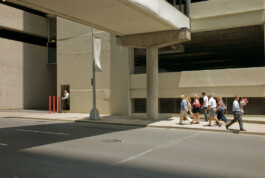
1
Nathan Millis (US)
Chicago, Illinois (US)
(1) Please introduce yourself: What is your name, where are you from, what do you do?
I’m Nathan Millis, I grew up and currently live in the Suburbs of Chicago. For the last 17 years I have been photographing around the US, and recently edited that work into a book draft titled Welcome to Normal.
(2) What is your relationship with photography and how did you get into it?
Any good therapist would say it’s problematic. While photography is not how I am making a living, it is definitely the thing I spend the most time on. Every non-photo job I’ve had has been largely based on if it would be flexible enough to allow me the time to be out making work. I don’t remember what got me into photography; it is just something I have always been interested in. At around 13 years old I had some idea that I wanted to be a photographer, probably a photojournalist, but at the time had no idea what that meant.
(3) What do you think triggers you to photograph in a certain moment? Is it planned or solely driven by intuition?
I don’t plan individual photographs, and I hope to stay open to whatever I come across, but I know that what I come across and notice is shaped by a number of regularly changing factors. I am sure I look for different things when I am in Selma ( AL), compared to Seattle (WA), and the choice of which one I am going to photograph in is planning, at least in some small way, the pictures I will be taking. I am also increasingly more likely to wait for something I think might be a potentially good photograph to happen. Often spending hours in the same parking lot, field, or street corner and waiting for people to naturally populate a scene that I found interesting, sometimes coming back multiple times. And while those all start as things I didn’t plan on finding, the time spent waiting for something, general or specific, to happen makes me hesitant to say that it is not at all planned. And we all have our little obsessions, and if I see a basketball hoop or someone mowing their yard I will probably want to take a picture of it.
(4) What is the story you want your pictures to tell?
I want my current project, Welcome to Normal, to talk about the level of anxiety, and its causes, in the United States in the early 21st century. I also hope the book asks the reader to consider how that fits into American history beyond just the boom years of the mid 20th century.
(5) Which city would you like to visit the most, and why?
I would be interested to see what life is like in Mogadishu. It is a place I feel I cannot really understand without seeing it in person.
(6) What is the Driving force behind creation?
My initial thought was that it is probably based in a desire to be heard, but that might not account for people creating things that are never intended to be shared. I guess there could be any number of driving forces. The differences between creating a work of art, creating a business, creating a family, and creating a cure for cancer could be pretty disparate. It might just come down to a desire to leave some mark that will exist after you’re gone, but you probably need a smarter person then me to answer this.
(7) Which project did you never finish?
I have been photographing one project for so long that there really have not been others that I started and didn’t finish. There is a long list of ones I regret never getting beyond the research stage of, but hopefully I will be able to eventually get back to some of those.
(8) What is that «one thing» you have never managed to photograph and is now gone for good?
I use to spend some time each summer on the small family farm my mother grew up on, and while it is not gone it, like most small farms, is drastically different now.
(9) If you could travel back / forth in time, what advice would you give your younger / older self?
I would tell adolescent me to learn other languages, teenage me to photograph those ridiculous high school parties, and young adult me to not worry about not knowing enough before trying new things. Hopefully my older self will not need current me’s advice.
(10) What do you prefer saying: to «take a photograph» or to «make a photograph», and why?
Maybe out of habit, but I say «take.» While I am pretty meticulous about framing in the camera, my attempts to not self-censor while out taking photos and to accept both mistakes and that at times I am not sure why I am taking certain photos makes me prefer to use what I see as the more casual phrase. It is in the editing, selection, and sequencing process that I feel like I am actually making something.
(11) What is the most interesting experience you have had while photographing?
I know I am dodging a little bit, you did ask me to single it out, but it is a bunch of different conversations and happenings that are memorable; In Little Rock I listened to two friends barter over the price of oral sex, I talked to a guy in Fargo about his ability to make enough to live on off unemployment benefits and picking scrap metal out of the trash but not from any job he could get, there was a triple stabbing in a Kentucky motel six I was staying in, a few older men hit me with umbrellas and canes when I was photographing an anti war protest in Istanbul following the US lead invasion of Iraq.
(12) If it wasn’t for photography, what would you be interested in doing instead?
Like I said earlier I don’t currently make a living off photography, but if I didn’t need the job flexibility to keep making new work, I think I would be trying to do work more directly related to public policy or political campaigning. I think working towards specific outcomes would be rewarding, and that I would even enjoy the gamesmanship involved.
(13) What are you currently working on, and—if there is—what is your next project or journey?
I am currently focused on trying to get opinions on the book draft and finding a publisher to work with. I am also working on organizing and editing a bunch of pictures I took while working on Welcome to Normal that may turn into different projects or are extensions of things I have already been working on. Next week I plan on heading out to photograph around Oklahoma, Kansas, and Nebraska and for a few weeks. It has been a few years since I have been out there and think it could be an interesting time to go again.
Thank you, Nathan.
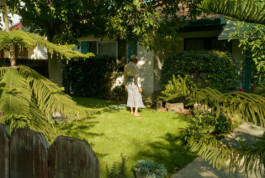
2
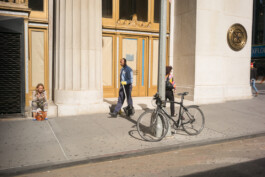
3
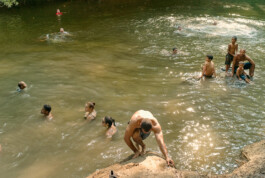
4
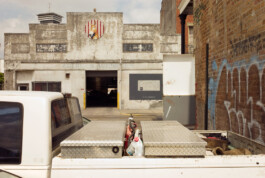
5
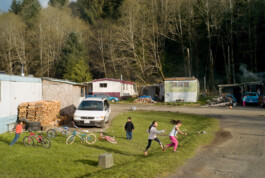
6
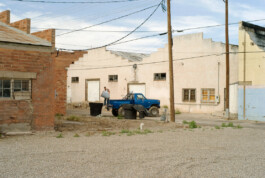
7
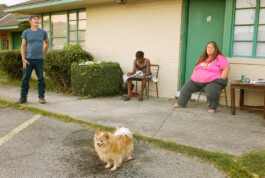
8
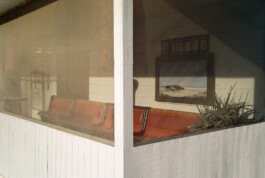
9
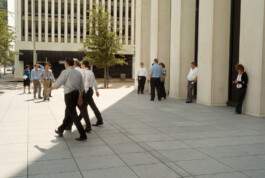
10
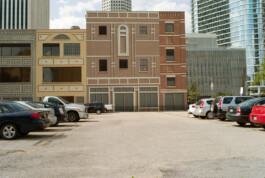
11
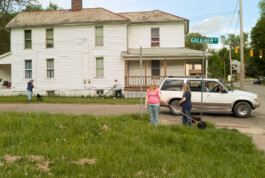
12
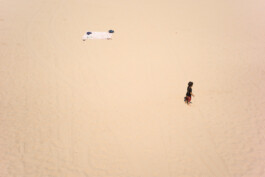
13
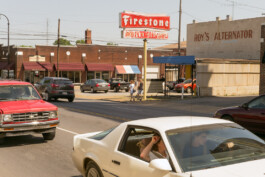
14
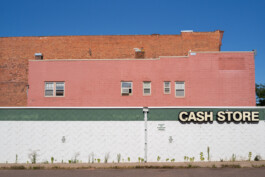
15
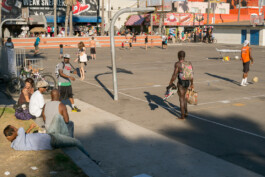
16
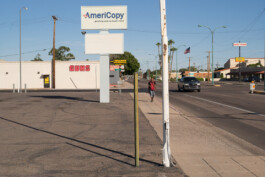
17
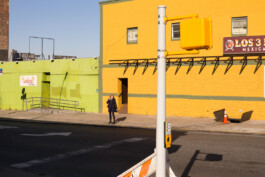
18
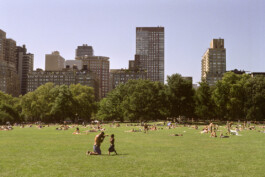
19
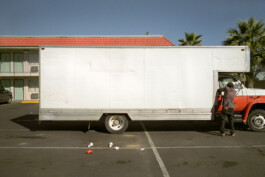
20
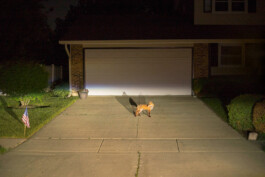
21
Images
1 Charlotte, North Carolina (US), 2010.
2 Pasadena, California (US), 2008.
3 New York City, New York (US), 2013.
4 Philadelphia, Pennsylvania (US), 2012.
5 New Orleans, Louisiana (US), 2009.
6 Olympic Peninsula, Washington (US), 2011.
7 Roswell, New Mexico (US), 2009.
8 Georgia (US), 2010.
9 Florida (US), 2009.
10 Houston, Texas (US), 2012.
11 Houston, Texas (US), 2012.
12 Zanesville, Ohio (US), 2013.
13 Los Angeles, California (US), 2013.
14 Cleveland, Tennessee (US), 2014.
15 Ashland, Wisconsin (US), 2014.
16 Los Angeles, California (US), 2014.
17 Mesa, Arizona (US), 2014.
18 Brooklyn, New York (US), 2015.
19 New York City, New York (US), 2004.
20 Phoenix, Arizona (US), 2004.
21 Elk Grove Village, Illinois (US), 2018.
© Nathan Milis, 2008–2018.
Interview

1
Nathan Millis (US)
Chicago, Illinois (US)
(1) Please introduce yourself: What is your name, where are you from, what do you do?
I’m Nathan Millis, I grew up and currently live in the Suburbs of Chicago. For the last 17 years I have been photographing around the US, and recently edited that work into a book draft titled Welcome to Normal.
(2) What is your relationship with photography and how did you get into it?
Any good therapist would say it’s problematic. While photography is not how I am making a living, it is definitely the thing I spend the most time on. Every non-photo job I’ve had has been largely based on if it would be flexible enough to allow me the time to be out making work. I don’t remember what got me into photography; it is just something I have always been interested in. At around 13 years old I had some idea that I wanted to be a photographer, probably a photojournalist, but at the time had no idea what that meant.
(3) What do you think triggers you to photograph in a certain moment? Is it planned or solely driven by intuition?
I don’t plan individual photographs, and I hope to stay open to whatever I come across, but I know that what I come across and notice is shaped by a number of regularly changing factors. I am sure I look for different things when I am in Selma ( AL), compared to Seattle (WA), and the choice of which one I am going to photograph in is planning, at least in some small way, the pictures I will be taking. I am also increasingly more likely to wait for something I think might be a potentially good photograph to happen. Often spending hours in the same parking lot, field, or street corner and waiting for people to naturally populate a scene that I found interesting, sometimes coming back multiple times. And while those all start as things I didn’t plan on finding, the time spent waiting for something, general or specific, to happen makes me hesitant to say that it is not at all planned. And we all have our little obsessions, and if I see a basketball hoop or someone mowing their yard I will probably want to take a picture of it.
(4) What is the story you want your pictures to tell?
I want my current project, Welcome to Normal, to talk about the level of anxiety, and its causes, in the United States in the early 21st century. I also hope the book asks the reader to consider how that fits into American history beyond just the boom years of the mid 20th century.
(5) Which city would you like to visit the most, and why?
I would be interested to see what life is like in Mogadishu. It is a place I feel I cannot really understand without seeing it in person.
(6) What is the Driving force behind creation?
My initial thought was that it is probably based in a desire to be heard, but that might not account for people creating things that are never intended to be shared. I guess there could be any number of driving forces. The differences between creating a work of art, creating a business, creating a family, and creating a cure for cancer could be pretty disparate. It might just come down to a desire to leave some mark that will exist after you’re gone, but you probably need a smarter person then me to answer this.
(7) Which project did you never finish?
I have been photographing one project for so long that there really have not been others that I started and didn’t finish. There is a long list of ones I regret never getting beyond the research stage of, but hopefully I will be able to eventually get back to some of those.
(8) What is that «one thing» you have never managed to photograph and is now gone for good?
I use to spend some time each summer on the small family farm my mother grew up on, and while it is not gone it, like most small farms, is drastically different now.
(9) If you could travel back / forth in time, what advice would you give your younger / older self?
I would tell adolescent me to learn other languages, teenage me to photograph those ridiculous high school parties, and young adult me to not worry about not knowing enough before trying new things. Hopefully my older self will not need current me’s advice.
(10) What do you prefer saying: to «take a photograph» or to «make a photograph», and why?
Maybe out of habit, but I say «take.» While I am pretty meticulous about framing in the camera, my attempts to not self-censor while out taking photos and to accept both mistakes and that at times I am not sure why I am taking certain photos makes me prefer to use what I see as the more casual phrase. It is in the editing, selection, and sequencing process that I feel like I am actually making something.
(11) What is the most interesting experience you have had while photographing?
I know I am dodging a little bit, you did ask me to single it out, but it is a bunch of different conversations and happenings that are memorable; In Little Rock I listened to two friends barter over the price of oral sex, I talked to a guy in Fargo about his ability to make enough to live on off unemployment benefits and picking scrap metal out of the trash but not from any job he could get, there was a triple stabbing in a Kentucky motel six I was staying in, a few older men hit me with umbrellas and canes when I was photographing an anti war protest in Istanbul following the US lead invasion of Iraq.
(12) If it wasn’t for photography, what would you be interested in doing instead?
Like I said earlier I don’t currently make a living off photography, but if I didn’t need the job flexibility to keep making new work, I think I would be trying to do work more directly related to public policy or political campaigning. I think working towards specific outcomes would be rewarding, and that I would even enjoy the gamesmanship involved.
(13) What are you currently working on, and—if there is—what is your next project or journey?
I am currently focused on trying to get opinions on the book draft and finding a publisher to work with. I am also working on organizing and editing a bunch of pictures I took while working on Welcome to Normal that may turn into different projects or are extensions of things I have already been working on. Next week I plan on heading out to photograph around Oklahoma, Kansas, and Nebraska and for a few weeks. It has been a few years since I have been out there and think it could be an interesting time to go again.
Thank you, Nathan.

2

3

4

5

6

7

8

9

10

11

12

13

14

15

16

17

18

19

20

21
Images
1 Charlotte, North Carolina (US), 2010.
2 Pasadena, California (US), 2008.
3 New York City, New York (US), 2013.
4 Philadelphia, Pennsylvania (US), 2012.
5 New Orleans, Louisiana (US), 2009.
6 Olympic Peninsula, Washington (US), 2011.
7 Roswell, New Mexico (US), 2009.
8 Georgia (US), 2010.
9 Florida (US), 2009.
10 Houston, Texas (US), 2012.
11 Houston, Texas (US), 2012.
12 Zanesville, Ohio (US), 2013.
13 Los Angeles, California (US), 2013.
14 Cleveland, Tennessee (US), 2014.
15 Ashland, Wisconsin (US), 2014.
16 Los Angeles, California (US), 2014.
17 Mesa, Arizona (US), 2014.
18 Brooklyn, New York (US), 2015.
19 New York City, New York (US), 2004.
20 Phoenix, Arizona (US), 2004.
21 Elk Grove Village, Illinois (US), 2018.
© Nathan Milis, 2008–2018.